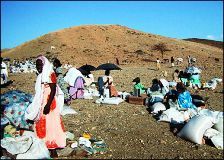UN fears for resettled Eritreans’ safety, close to UNMEE operations
ASMARA, Feb 26 (AFP) — The UN Mission in Ethiopia and Eritrea (UNMEE) said Saturday it was concerned for the safety of some 19,000 displaced Eritreans who have been resettled close to its demining operations near the Ethiopian border.

|
|
Residents of the Adi Keshi Internally Displaced Persons camp in western Eritrea receive food aid. (AFP). |
At the same time, UNMEE spokeswoman Gail Bindley-Taylor Sainte said the United Nations supported the resettlement of the Eritreans in or at least close to their home villages.
Some villagers “may be a little too close to where we are located because we have a number of operations there, including mine action, and the military also have operations there,” Sainte said.
Still, she said, “it is a better place for them. It is close to where they originally lived and I think if you were in the same position you would want to go back to your home as soon as you could.”
Tensions remain high on the frontier between rival Ethiopia and Eritrea five years after their 1998-2000 border war.
Last week, the United Nations and the European Union expressed concern about military buildups along the disputed border despite current relative calm and urged Addis Ababa and Asmara to exercise restraint.
The 19,000 resettled Eritreans had been living in camps for internally displaced people for six years after being forced to leave their villages in the southwest region of Gash Barka during the border war.
But since the beginning of February, the Eritrean government and its development partners have been resettling the displaced in or close to their homes in Gash Barka, which is in a UN-monitored buffer zone along the border.
“The people were living in a harsh environment, they were suffering,” Eritrean Information Minister Ali Abdu said. “They have all their right to stay in their homeland, be there a risk or not.”
Ali Abdu dismissed UNMEE’s concerns for the security of the resettled, saying the mission should be more concerned about the continuing border dispute.
Eritrea and Ethiopia signed a peace agreement in December 2000 promising to respect a border demarcation to decided by an independent commission.
But in September 2003, Ethiopia rejected the commissions finding and in November 2004 called for “adjustments”.
Eritrea has repeatedly said it will only accept the full implementation of the independent commission’s “final and binding” ruling.
